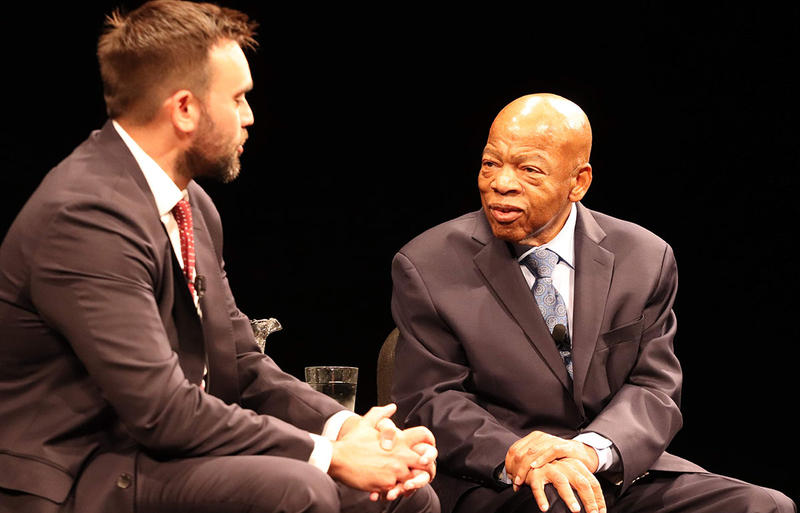(Photo credit: Vermont Humanities Council)
Early this month, I had the sudden opportunity to attend a talk given by U.S. Congressman John Lewis– Sometimes we have the opportunity to experience a living legend.. Congressman Lewis is one of the group of Civil Rights activists known as the Big Six of the 1960’s Civil Rights Movement. My brief historical summary is included here because I did *not* learn about this in school as a child:
Congressman Lewis was one of the leaders of the march that came to be known as Selma, Alabama’s Bloody Sunday in 1965. The non-violent political protest against racial injustice was intended to be a 54 mile march from Selma to Montgomery, Alabama. The march did not get farther than six blocks– met by state troopers at the end of the Edmund Pettus Bridge.
At this time, Lewis was an activit, organizer, and leader. The activists on the bridge were ordered to disperse, and when they stopped to pray, they were then met with tear gas and swinging clubs. Before getting admitted to a hospital, Lewis went on national television with a fractured skull asking President Johnson to intervene in Alabama.
(Krista Tippett’s interview with Congressman Lewis on the poignancy of nonviolent protest is very moving—check it out in the NPR archives of the radio show On Being.)
I admit: Being in the same group space as Congressman Lewis was similar to what I experienced when I saw His Holiness the Dalai Lama speak during Losar (Tibetan New Year) in Dharmsala, India years ago. A palpable goodness and spiritual power filled the air.
Congressman Lewis proceeded to be arrested dozens of times in his life, all the while maintaining the dignity of nonviolent protest. The calm and the clarity with which congressman Lewis spoke the evening I saw him was infectious. He urged us all to listen to our hearts and stand up in our lives– and in our country– for what we know is just.
Not only is his nonviolent protest example completely applicable to current times, but there was an even more contemporary aspect to the evening: His primary purpose in visiting our little Vermont city was to encourage young people to read.
Congressman Lewis’s talk was followed by a talk by Andrew Aydin, the co-creator and co-author of Lewis’s graphic novel March. Andrew Aydin is a staffer of Congressman Lewis and a self-proclaimed lifelong comic book geek. March chronicles Lewis’s Civil Rights story in black-and-white graphic novel format, illustrated by Nate Powell. The idea of such a novel about the Civil Rights Movement was once laughed at, and Aydin reported that March is now mandatory reading in all New York City public schools.
The ingenuity and creativity of Congressman Lewis and Ayden, the creation of the March graphic novel trilogy, imprinted me. Creative literacy does not come to mind when I think of politics or political protest. The formula of collaborative passion, creativity, determination, experience, and just intentions can lead to unprecedented and fruitful results, even if a room full of politicians once laughed at you and your fellow creator(s).
It takes courage to be original, to stand up for what you believe in. We are wired to fear public or peer rejection. I regularly work with clients to successfully hold and address this fear of rejection by others.
Congressman Lewis, the son of sharecroppers, loved to read as a boy. He was once denied the right to a library card in his Alabama hometown of Troy. Decades later, he was invited back to his home library, to speak on own book, now in the library. And right as rain, he did finally get issued a library card.
I encourage everyone two things: 1. Keep your eyes peeled for potential living legends who visit your town! The inspiration can leave a living imprint in you, feed your soul.
2. Use the originality of Ayden’s and Lewis’s graphic novel as an example in your own life. Where in your life can you take your geeky passion and apply it to something much larger then yourself? What is it that you were meant to create in your life that can positively affect others? This may especially mean teaming up with others, as Ayden and Lewis did.
Don’t let the potential laughter or dismissal by others dissuade you. Creativity is akin to divinity, and a God-given grace. Co-creating with other people can even upgrade the creative process *and* final result a few notches, or even exponential notches.
One last encouragement: Read! (Former English teacher here) … Specifically, read March!


Recent Comments